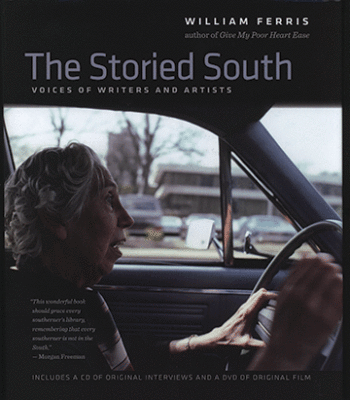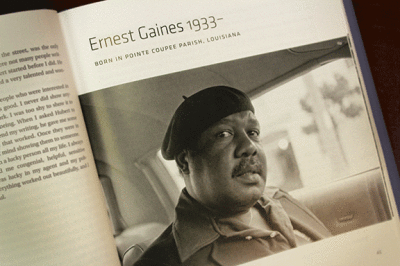 William Ferris G’67 Gr’69 was teaching American Studies and Afro-American Studies at Yale in the 1970s when he conducted most of the interviews that make up The Storied South: Voices of Writers and Artists. But it was during the previous decade at Penn that he laid the groundwork for his career as a folklorist.
William Ferris G’67 Gr’69 was teaching American Studies and Afro-American Studies at Yale in the 1970s when he conducted most of the interviews that make up The Storied South: Voices of Writers and Artists. But it was during the previous decade at Penn that he laid the groundwork for his career as a folklorist.
“When I came to Penn I didn’t really know what folklore was,” recalls Ferris, the former chair of the National Endowment for the Humanities who is now the Joel R. Williamson Eminent Professor of History at the University of North Carolina at Chapel Hill. “I brought a box of tapes and photographs from my earlier work in Mississippi and sat down in the office of Kenneth Goldstein, my advisor, and I showed this to him and I said, ‘Dr. Goldstein, is this the kind of work I can do here?’ And he said, ‘My boy, that will be your dissertation. Keep doing it.’”
Ferris’s own voice is unmistakably Southern, a rather high, gentle Mississippi drawl that is both down-to-earth and genteel. (“It’s good to hear your voice,” he begins warmly, even though we’ve only spoken on the phone once before.) The voices in The Storied South, which was published last August by the University of North Carolina Press and comes with a DVD and CD, are unmistakably Southern as well. But the men and women who speak from that sprawling front porch of art and letters represent a remarkably broad vocal range. They include the famous (Eudora Welty, Alice Walker, Robert Penn Warren, Walker Evans), the distinguished-if-not-exactly-household-names (Cleanth Brooks, John Dollard, C. Vann Woodward), and the talented-but-relatively-obscure. The interviews themselves are presented as dramatic monologues, meaning that any of Ferris’s questions or other prompts have been discreetly removed.
 The result is stories: Eudora Welty literally walking into a lake to be picked up for an afternoon sail with William Faulkner (who spoke not a word). Pete Seeger (who might be considered an honorary Southerner), discussing how he changed the verb in a certain song whose refrain was “We Will Overcome” to the infinitely more powerful Shall. Ernest Gaines, describing how he was able to meld the wealth of slave narratives he had found in the WPA collections into The Autobiography of Miss Jane Pittman.
The result is stories: Eudora Welty literally walking into a lake to be picked up for an afternoon sail with William Faulkner (who spoke not a word). Pete Seeger (who might be considered an honorary Southerner), discussing how he changed the verb in a certain song whose refrain was “We Will Overcome” to the infinitely more powerful Shall. Ernest Gaines, describing how he was able to meld the wealth of slave narratives he had found in the WPA collections into The Autobiography of Miss Jane Pittman.
“A number of the writers and speakers worked with the WPA,” notes Ferris, including Welty, Sterling Brown, and Evans. “Ernest Gaines was strongly influenced by those interviews with ex-slaves in his own work, The Autobiography of Miss Jane Pittman. What it did was to break people out of their worlds, and bring them face to face with entirely different landscapes and people.”
Some of the stories were sparked by single interviews; others unfolded over multiple conversations.
“The person I knew best and longest was Eudora Welty,” Ferris recalls. “I interviewed her probably five times, which is why the interview is longer and much more detailed than others I interviewed once, like Pete Seeger and John Dollard. But as I went through these interviews, in every one I found nuggets, where people would talk in a very off-the-cuff way about things that are usually viewed in a very serious, formal way.”
Welty, for example, offered some wry stories about rural Mississippi women, including the ones she wrote to requesting seeds for garden flowers after she had read about plants for sale in the Mississippi Farm Bulletin. “They would write back, ‘How could you presume to ask me to go out and dig those plants in this kind of weather?’” Ferris recounts. “She saw humor and beauty in the everyday worlds that these people represented, and wove that into her fiction—in the same way that Pete Seeger wove this amazing hymn together to create ‘We Shall Overcome,’ and Ernest Gaines crafted, from the voices of family and friends that he grew up with, the sound of the voice of Miss Jane Pittman.”
Ferris took the photographs and made all the sound recordings and films that are on the DVD. After spending several years editing the text, he was quite moved to finally hear, back to back on the CD, “every voice, from the soft voice of Eudora to the equally soft tones of Alice Walker—each voice has a distinctive character to it, and it’s almost as though they’re in the room with you,” he notes. “I think for the reader it’s important to know what each person sounded like, and in some cases looked like, when they were speaking.”
Since Ferris also serves as senior associate director of the Center for the Study of the American South, his decision to record his subjects in multiple media proved to be a farsighted one.
“It was a folklorist’s dream to have all of these media in a single place within a book,” he says. “I always asked if they would be comfortable allowing me to interview and photograph and sometimes to film them, and they always said Yes,” he says. In doing so, he was, “without knowing it, basically creating a sort of resource on the foundations for study of the American South.”
When he moved to the University of Mississippi in 1979, he became director of the Center for Study of Southern Culture. “We created the first BA and MA programs in the country in the field of Southern studies,” says Ferris, who notes that there are similar programs now at UNC and the University of South Carolina. “And we drew heavily on the work of all of the people in this book.”
Today, he adds, “there is a clearly defined and rapidly evolving field of the study of the South, with fields like Contested Memory, which Fitzhugh Brundage here at UNC and David Blight at Yale have developed, where you look at whose memory are we talking about, the white or the black, or the Jewish or the Irish, all these voices. There’s also the Global South, which looks at how the South shapes the rest of the world and is being shaped by the global worlds.”
Some things have changed in the South; some haven’t. “I think of Joyce’s Portrait of the Artist as a Young Man and his character Stephen Daedalus, who says he fled Ireland and the nets of family, politics, and religion,” says Ferris. “The Southerner would add: race. Those are the nets that Southerners have struggled with in every generation, and continue to struggle with. So things have changed, but they’ve also remained the same. But I think it’s fair to say that none of the people in this book would have ever imagined a field called Southern studies.” —S.H.




